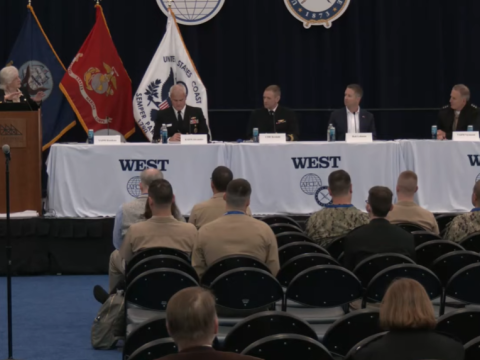The Enterprise and Its Effects
The director of DISA talked about the enterprise and the future of military operations.
"At the end of the day, it's all about effects," Lt. Gen. Carroll Pollett, USA, director, Defense Information Systems Agency (DISA), said during his LandWarNet address this morning. Focusing his remarks on the enterprise, the general emphasized the need for partnerships to enable success on the battlefield and other world situations. Moving forward, enterprise leaders and users will have several issues to address, including how to leverage the classified and unclassified domains to create a common operational picture. The need for warzone advantages are unlikely to diminish. "I think in the future we're going to be in persistent conflict," Gen. Pollett stated. Terrorism and the cyber domain have redefined persistent operations and what the military must to do have positive effects and to protect forces, he explained. Added to these challenges is the concern over resource constraints which will force defense officials to determine how to gain efficiencies without compromising missions. "We no longer can afford to compete with each other," the general said about the various military organizations. Saving money by reducing duplicate technologies will help the military fund resources necessary for the tactical edge. The power to connect into the network means that warfighters can access protected infrastructure and enterprise services anytime, anywhere, from any device. Gen. Pollett said the military needs to create an integrated platform across the Defense Department, and that requirements have changed. "The strategic world collapsed inside the tactical world and we're never going back," he explained. The tactical edge must inform the design of the network rather than pushing from the center to the edge. Gen. Pollett shared that the network must be global, always on and full spectrum. In addition, it needs capacity and diversity, though to him, diversity is more important because the connections have to have survivability. Converging enterprise service centers will help users to reach information they need form anywhere in the world. The general discussed that DISA has placed 53 content delivery nodes around the world to move content forward so troops can optimize and use information. Gen. Pollett emphasized the need for common standards so anyone can access what they need. He encouraged information-technology professionals to work on enabling identification, access-management and attribution-based capabilities. Other necessary technologies include joint search engines and video collaboration. Finding solutions often involves creativity. When the surge in Afghanistan took place, the theater was satellite communications-centric. The Army worked to outsource services to DISA, which was able to put in four terrestrial links leading out of Afghanistan into various surrounding areas. Before that move, no terrestrial links existed, according to the general. In addition, DISA helped reposition commercial and military satellites to support operations better. Gen. Pollett also touted the Afghan Mission Network saying it can serve as a template for future environments. Talking about security, he emphasized that mission assurance no longer can be added at the end of processes, it must be built into the capabilities of the enterprise, reducing the vulnerability to attack that the edge. Enhancing security means more than reacting to dangers. "We have to be able to see a threat coming at us," Gen. Pollett stated. DISA is working with U.S. Cyber Command on improving security. Turning his attention to enterprise email, he said leadership is working to address the crazy environment of multiple directories, trying to protect identities and striving to implement standards. "This is going to redefine the way the department uses enterprise infrastructure in terms of what we do," Gen. Pollett explained. Already more than 90,000 soldiers have migrated to the enterprise and 2,000 members of other services who work on Army bases have migrated as well. Three combatant commands, DISA and the Defense Logistics Agency are in the process of moving accounts to the enterprise e-mail as well. Mobility in the new environment is a major focus of the general because he says secure collaboration is essential. To bring about all the necessary changes, the Gen. Pollett said the military from top to bottom has to start thinking enterprise and that young troops must take the lead in pushing alterations to culture, which still poses the biggest obstacle to advancement.


Comments